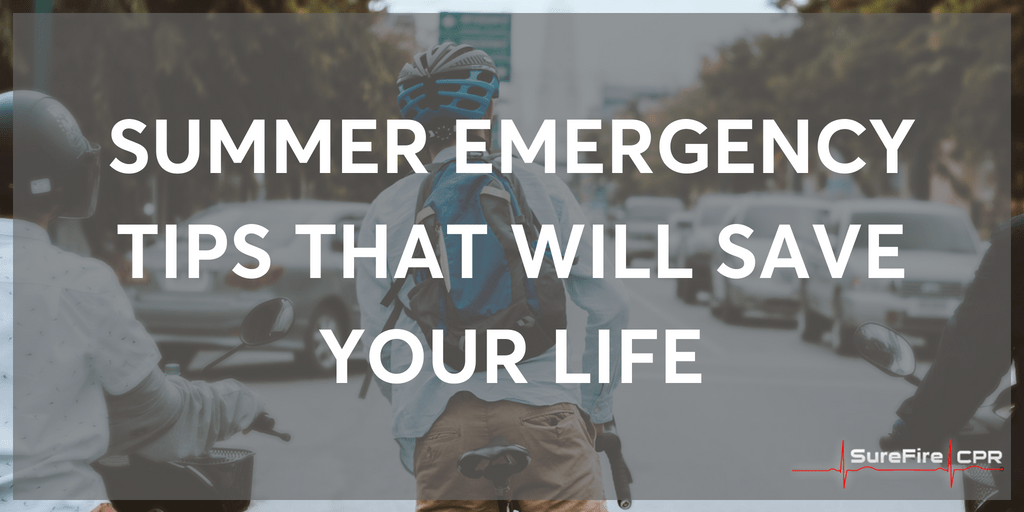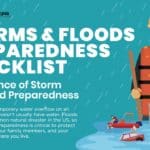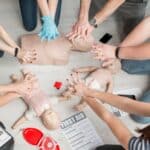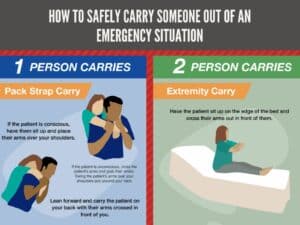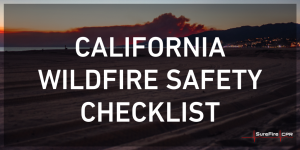Summer is a great time to get outdoors and enjoy the beautiful weather. Yet summer emergencies sometimes happen. Fortunately, there are many things you can do to stay safe during summer, and these include:
-
Wear a Bike Helmet
Regardless of whether you’re planning a leisurely bike ride on back roads or a rigorous trek along mountain bike trails, wearing a bike helmet is a must. To better understand the importance of wearing a bike helmet, let’s consider the following statistics from the Federal Highway Administration (FHWA):
- Up to 80% of all fatal bike crashes involve head injuries, yet only 18% of bicyclists wear bike helmets.
- Universal bicycle helmet use for kids between the ages of 4 and 15 years old would prevent up to 45,000 head injuries and 55,000 scalp and face injuries each year.
- Bike helmets are up to 88% effective in mitigating head and brain injuries.
Of course, it is important to note that not all bike helmets are created equal. Bike helmets are available for recreation, road bikes and mountain bikes, so you should review all of your bike helmet options and make your decision accordingly. Plus, you should select a bike helmet that is snug but not tight and offers expert construction and plenty of cushioning.

-
Swim Safely
Safe swimming is paramount. The American Red Cross offers recommendations to ensure you can stay safe when you swim at a beach or swimming pool, and these include:
- Swim in Designated Areas Only: Swim only in areas where a lifeguard is on duty.
- Use the Buddy System: Never swim alone; instead, you should swim with a buddy at all times.
- Pay Close Attention to Children: Never leave a child unattended in or near water and do not have one child watch over another. Also, teach kids to always ask permission to go in or near water.
- Use U.S. Coast Guard-Approved Life Jackets: Give inexperienced swimmers or young children U.S. Coast Guard-approved life jackets any time they are in or around water.
- Ensure Emergency Equipment Is Available: Swim at a beach or swimming pool where reaching or throwing equipment, a cell phone, life jackets and a first aid kit are readily available.
There is no substitute for active supervision when swimming, either. If you avoid distractions during a trip to a beach or swimming pool, you may be able to avoid a summertime swimming emergency.
-
Practice Playground Safety
The Centers for Disease Control and Prevention (CDC) notes emergency departments treat more than 200,000 playground-related injuries in kids 14 and under each year. However, practicing playground safety can be simple, and here are several ways that you can do just that:
- Identify Potential Playground Hazards: Look for hazards like rusted or broken playground equipment or dangerous surfaces. If you identify any dangers, report them to the appropriate local office immediately.
- Dress Appropriately: Necklaces, purses, scarves and any clothing with drawstrings may get caught on playground equipment and pose a strangulation hazard. As such, these items should be avoided.
- Choose the Right Playground Based on Age: Select a playground with age-appropriate equipment. For example, a baby who is learning to walk should only play in an area that features a smooth surface.
- Play on a Safe Surface: Avoid playgrounds with non-impact absorbing surfaces like asphalt, concrete and gravel. Playgrounds with surfaces such as rubber mats, sand, mulch, shredded rubber or various artificial materials offer viable alternatives.
When it comes to playground safety, it is always better to err on the side of caution. Thus, if you feel a playground may be unsafe, it may be a good idea to avoid this playground altogether.
Remember, there are dozens of playgrounds in cities and towns nationwide. If you conduct an in-depth playground search, you should have no trouble finding a safe playground close to home.
-
Get Ready to Camp
Camping offers a fun way to enjoy the outdoors with family members and friends. If you decide to go camping this summer, there are many ways to protect yourself against injuries and diseases, such as:
- Get Vaccinated: Visit your doctor so you can ensure you are up to date on all of your vaccines.
- Pick Up Protective Gear: A helmet, sturdy shoes and a life jacket are camping essentials.
- Avoid Wild Animals: Never feed, touch or get near wild animals while camping.
- Use Insect Repellent: Apply insect repellent that contains DEET to combat mosquitoes, ticks and other insects that may cause diseases.
- Bring Adequate Bedding and Clothing: Prevent nighttime hypothermia on cool nights by packing sufficient bedding and clothing to stay warm.
- Practice Fire Safety: Don’t build a fire under low trees or leave a fire burning unattended. Furthermore, extinguish a fire completely before you go to sleep.
Safe camping is fun camping. If you take advantage of the aforementioned tips, you can limit risk while you get the most out of your camping adventure.
-
Sign Up for Emergency Training Classes
Having the ability to administer first aid during a summertime emergency is crucial. If you know what it takes to support an individual who is drowning, experiencing sudden cardiac arrest (SCA) or suffering from any other ailment or illness, you could prevent the loss of life in an emergency.
Many emergency training classes are available, and these include:
- Basic First Aid: A basic first aid class covers a wide range of topics, including how to provide assistance in hot and cold emergencies and how to treat wounds and other injuries.
- Cardiopulmonary Resuscitation (CPR): A CPR class teaches students how to perform CPR on adults, kids and infants, assist conscious and unconscious choking victims, use an automated external defibrillator (AED) and provide immediate first aid in emergencies.
- Pediatric First Aid: A pediatric first aid class provides students with first aid and CPR training for pediatric emergencies.
There is no telling when or where an emergency may happen. But with comprehensive emergency training and safety tips, anyone can become a life-saver in any emergency, at any time.
For those who want to earn basic first aid, CPR or other emergency training certifications, classes from SureFire CPR are ideal. SureFire CPR offers a variety of emergency training courses, all of which blend hands-on and classroom lessons and are taught by expert instructors. To find out more about our emergency training classes, please contact us today at (888) 277-3143.

